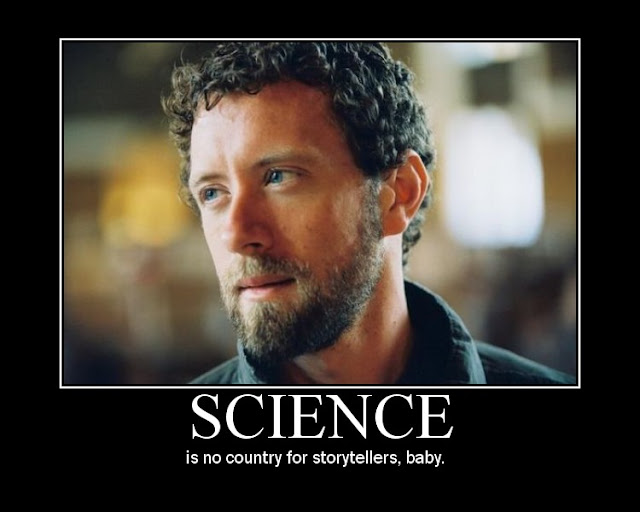Rick Santorum has fired yet another salvo into the Presidential race with his insistence that “science should get out of politics.”
Crossposted to The Suicidal Cactus Hour
To say that Rick holds that politics should serve ideology as opposed to the public weal is nothing new. His own campaign for “family values” has earned him…let’s just say a stain on his public persona. Rick is, after all, no stranger to the struggle to find definition…
The thing is, in his latest attempt to assert relevancy in this race, is that he illustrates a problem in the field of current GOP candidates. A willingness to side with intellectually stunted, yet ideologically “correct” folks. Climate change. Evolution. Crime statistics even. Part of this, is the result of the wedge issue of “Intelligent Design” that has allowed folks to take a window of belief and hold it as a “controversial issue of science” as opposed to “This is our belief and screw you scientists!” It allows folks who fear vaccines to hold up papers that aren’t supported as a shield of belief, as opposed to good science. It allows discounted studies to be clutched to try to stave off the EPA, the FDA, or any decent thoughts of how to avoid catastrophic change in how we look at industry and the future of energy production in the nation.
Some of these issues are based in economics. Folks are invested in industries that are threatened by change and advances in technology and increasingly pointed studies that are showing systemic changes in weather patterns unlike anything in the previous hundreds of years. Some of these are based on a shifting of narrative to force discussion about religious indoctrination in our schools under the aegis of competitive theory. Some of it is just hysterical natterings and support of these idiots only muddies the waters and creates enough chaos to try to force the other two areas forward.
In part, we can blame the Fairness Doctrine. The idea that there were always two sides, equal but opposite has been built into media narrative for some time. With the fall of the Fairness Doctrine, we still have that structure built into how we approach news–save that without the Fairness Doctrine, there is no onus to provide anything looking like a true balance. Folks can advance anything as competing, and then nod sagely as folks spout rubbish, and appear to be “fair and balanced.”
Part we can blame on the Neocon’s favorite of subjective reality. So long as you believe it, it has to be so, in your world view. Twisted out of true, and promoted further, it allowed us to march on Iraq and pursue goals of questionable merit based on what amounts to belief that something has to be true, because I said so.
It is a sort of intellectual Fundamentalism that reduces thought away from fact, and into the realm of belief. It is a dangerous sort of thought process, especially when used to justify public policy on someone’s “gut feelings.” Be that a gut that tells them that climate change is impossible, despite mounds of evidence. Be that a gut that tells them couples loving one another and marrying in different churches and ministries or faiths defines their own marriages. Be that a gut that says, “aquifers are pussies.” It boils down to folks who value narrative over facts. Who see science as a competitive force, because it keeps refuting claims of belief, as opposed to arguments based in fact.
Good public policy has to be rooted in fact. Good public policy isn’t just rooted in ideology and belief of the greater good, but also rooted in practical solutions. Practicality demands that we base public policy in solid fact, and that we alter our course when conditions change. Be that tax policy, be that how we deal with other nations diplomatically, be that how we address energy policy, be that how we deal with crime. Instead, we have a rise of those who see belief as being equal to fact, and this sort of Intellectual Fundamentalism keep trying to shift narrative, as opposed to discussing facts. That they see science as an enemy only shows how poorly they can defend these policies. In a sane world, we would trounce them out of office, and laugh as they gnashed their teeth and pounded fists on podiums, but we are not in a sane place in our politics now, and if anything, we need to work to get back to a sane place where we can look at facts without trying to put up blinders of ideology to counteract them.

29 comments